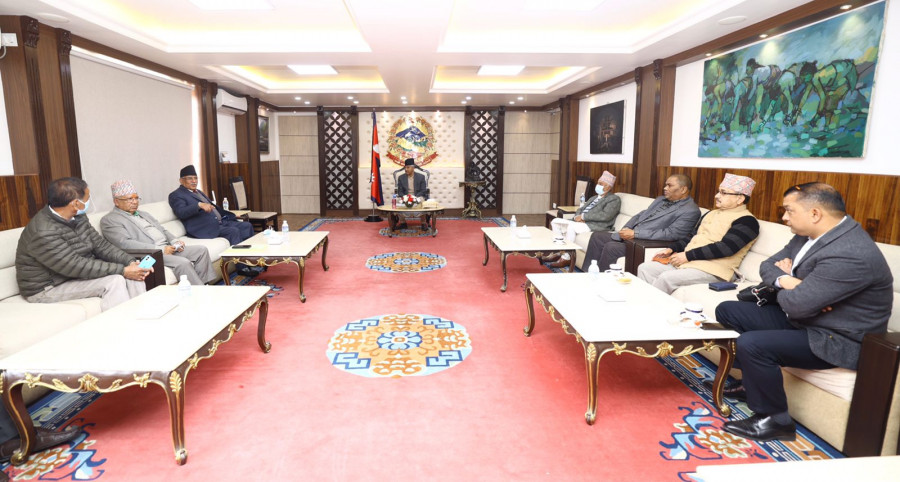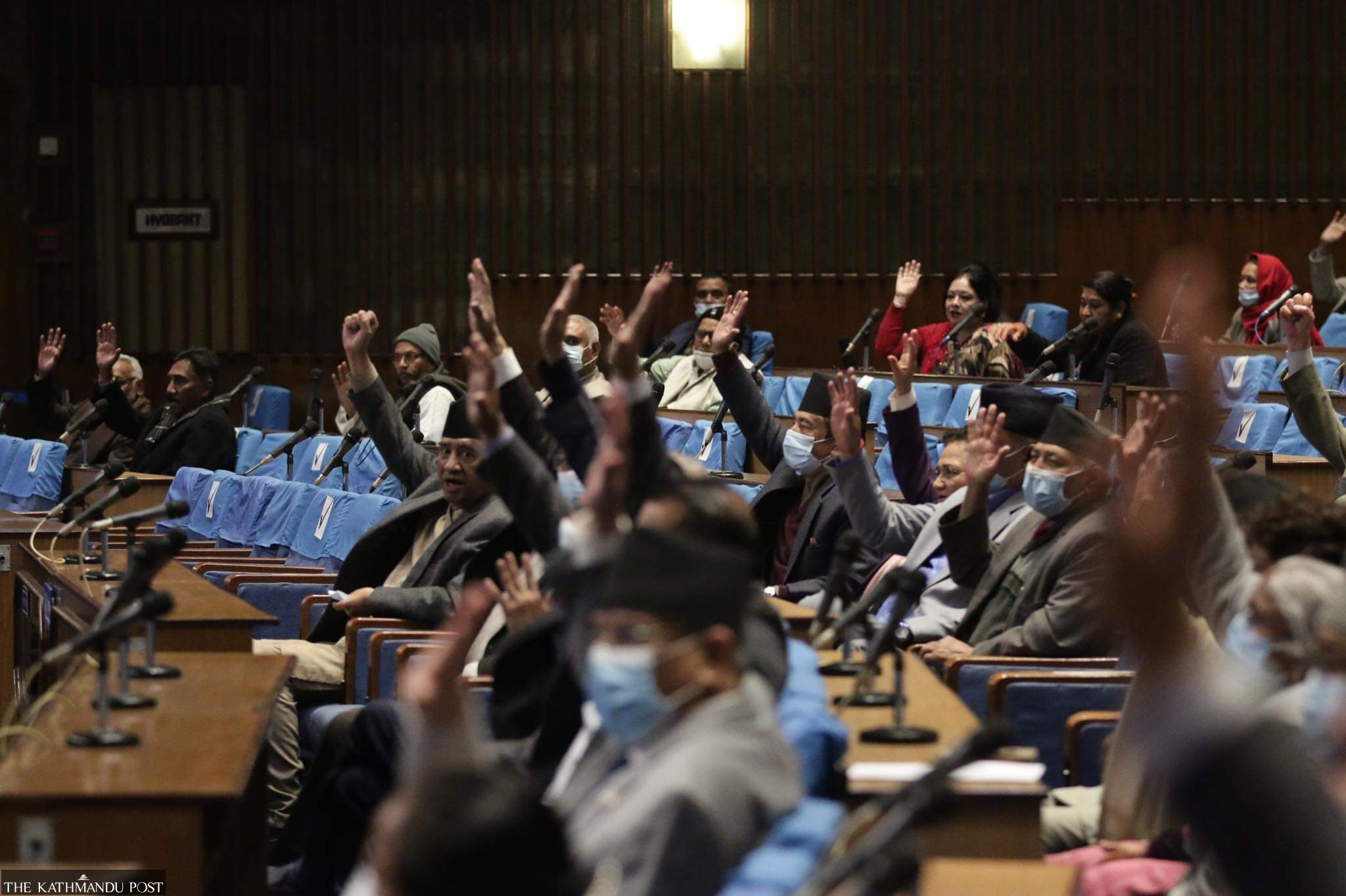
The ruling alliance was on the verge of a split as Prime Minister Sher Bahadur Deuba wanted parliamentary ratification of the Millennium Challenge Corporation-Nepal Compact by this month while his two coalition partners opposed it.
The Communist Party of Nepal (Maoist Centre) and the CPN (Unified Socialist) said they wanted amendments to some of the provisions, which they said were against the national interest, before the ratification.
After a series of meetings, the ruling parties on Saturday evening found a meeting point to keep the alliance intact while also endorsing the MCC compact. The two communist parties became ready to vote in favour of the American grant after an agreement to endorse “interpretative declaration” explaining Nepal's understanding of the MCC compact.
A meeting of the ruling parties on Sunday morning made an agreement to this effect. Accordingly, the Cabinet endorsed the 12-point declaration which was later approved through a majority vote in the lower house.
It clarifies Nepal's understanding that the MCC compact is just a development grant, it is not above the country’s constitution and Nepal can terminate it if there is anything that goes against the national interest.

Lawmakers voice their vote for the endorsement of Washington’s MCC Nepal Compact in the federal parliament in Kathmandu on Sunday. Elite Joshi/TKP
Amid claims from some of the cross-party leaders that the MCC compact is a part of the United States government’s military strategy, the interpretive declaration says Nepal shall not be a part of any strategic, military or security alliance including the Indo-Pacific Strategy.
“Nepal declares that the Constitution of Nepal, being the fundamental law of the land, shall prevail over the MCC compact and other associated agreements,” reads one of the points in the declaration. It also says that other than for the implementation of the MCC compact, Nepal will not comply with the current and future United States’ laws or policies.
The Millennium Challenge Account Nepal Development Board shall be governed by the laws of Nepal and regulated by the provisions of the MCC compact, according to the declaration.
Those involved in drafting the declaration say it is within the authority of any sovereign country to express its understanding through such declaration on any treaties.
The United Nations International Law Commission’s report of 2011 and the Vienna Convention on the Law of Treaties among other international laws and practices give room for such a declaration. Clause 1.2 of the report says “interpretative declaration” means a unilateral statement, however phrased or named, made by a State or an international organization, whereby that State or that organization purports to specify or clarify the meaning or scope of a treaty or of certain of its provisions. Similarly, Article 31 of the Vienna convention says a treaty shall be interpreted in good faith in accordance with the ordinary meaning to be given to the terms of the treaty in their context and in the light of its object and purpose.
Advocate Govinda Sharma Bandi, who was part of the team that drafted the interpretative declaration, said the interpretative declaration endorsed by the Parliament will be sent to the MCC Board together with the MCC compact ratified by the House.
“If the United States accepts it, the projects under the MCC compact go into implementation. The MCC compact will be terminated if the US rejects it,” Bandi told the Post.
The interpretative declaration also says that the MCC shall not have ownership of the intellectual property and that Nepal shall own and fully enjoy all the intellectual property created under the MCC compact agreement.
Similarly, it also has a specific clarification that Nepal’s Office of the Auditor General will be the final agency to audit financial transactions made under the Millennium Challenge Account-Nepal.
The declaration also has reinforced that Nepal can terminate the MCC compact within 30 days if it finds it against the interest of the country.
This provision, however, is in the original MCC compact agreement as well.
“The interpretative declaration is an answer to the people who are protesting on the streets and also clears the doubts and confusions among our lawmakers,” Minister for Finance Janardan Sharma said in parliament.
The declaration endorsed by the lower house, however, is in line with the concerns the Nepal government had raised before the MCC headquarters by the Ministry of Finance in September last year. The ministry had dispatched 11 concerns regarding the compact to the MCC headquarters, which then had provided point-wise clarifications.
As clarified in the interpretative declaration, MCC in its response on September 8, 2021 had said Nepal’s constitution prevails over the MCC compact while also stating that the Nepal government owns all intellectual property created in connection with the compact programme. In response to the concerns from the ministry, it also said that the Auditor General of Nepal can conduct the auditing of MCA-Nepal, that it wasn’t part of any military component and that the lands required for the transmission lines and the road projects under the MCC remain in the possession of the Nepal government.
“The declaration clarifies our understanding of the MCC compact. If anything happens against our understanding as per the interpretative declaration, we can terminate it,” said Nepali Congress lawmaker Gagan Thapa while addressing the Parliament on Sunday. “The MCC compact will move forward only after the United States government recognises the declaration passed by our Parliament,” added Thapa, a key member of the team that drafted the declaration.
Lawyers who have closely followed the MCC compact say they believe the United States will accept the interpretative declaration of the Nepal government.
“The interpretative declaration on the MCC compact has been adopted consistent with the rules of the international law by the sovereign Parliament of Nepal,” Semanta Dahal, a corporate lawyer, told the Post. “Hence, it is least possible that the US government or the MCC Board will reject it.”
The MCC Board’s next meeting has been scheduled for March 22.

RSS
In an interview with the Post and its sister paper Kantipur on February 6, Fatema Z Sumar, vice president of the Department of Compact Operations at the MCC, said without action by February 28, the MCC Board of Directors will discuss next steps at its March 22 meeting including whether to continue with the compact.
“Without ratification, it is within the MCC Board’s authority to discontinue Nepal's eligibility to receive the 500 million dollar grant from the United States. Such a decision will effectively end MCC's partnership with Nepal,” she said.
Sumar had visited Nepal immediately after sending a response to Nepal’s 11 concerns in September.
The interpretive declaration adopted by Nepal Parliament on Sunday also has a reference to the September MCC response.
“With reference to the letter dated September 8, 2021 received by Nepal from the Millennium Challenge Corporation, Nepal understands that the responses in the said letter shall aid in the interpretation and the implementation of the compact,” reads the 12th and last point of the interpretative declaration.













